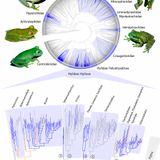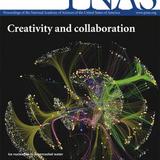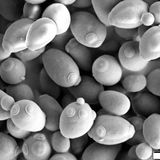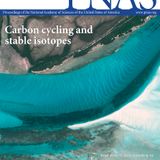RECENT ARTICLES

Multiple origins of green coloration in frogs mediated by a novel biliverdin-binding serpin
Edited by David M. Hillis, The University of Texas at Austin, Austin, TX, and approved June 5, 2020 (received for review April 16, 2020)This article requires a subscription to view the full text. If you have a subscription you may use the login form below to view the article. Access to this article can also be purchased.Green coloration of vertebrates is normally attributed to pigments and structural components inside skin chromatophores cells. However, these components do not account for the vivid blue-green colors of hundreds of species of frogs with sparse chromatophores. Our study shows...…Edited by David M. Hillis, The University of Texas at Austin, Austin, TX, and approved June 5, 2020 (received for review April 16, 2020)This article requires a subscription to view the full text. If you have a subscription you may use the login form below to view the article. Access to this article can also be purchased.Green coloration of vertebrates is normally attributed to pigments and structural components inside skin chromatophores cells. However, these components do not account for the vivid blue-green colors of hundreds of species of frogs with sparse chromatophores. Our study shows...WW…

Viral zoonotic risk is homogenous among taxonomic orders of mammalian and avian reservoir hosts
Edited by Nils Chr. Stenseth, University of Oslo, Oslo, Norway, and approved March 9, 2020 (received for review November 6, 2019)Identifying whether novel human viruses disproportionately originate from certain animal groups could inform risk-based allocations of research and surveillance effort. Whether such “special reservoirs” exist remains controversial. We show that the proportion of viruses that infect humans varies minimally across reservoir taxonomic orders. Instead, the number of human-infecting viruses increases proportionately to the total number of viruses maintained by each...…Edited by Nils Chr. Stenseth, University of Oslo, Oslo, Norway, and approved March 9, 2020 (received for review November 6, 2019)Identifying whether novel human viruses disproportionately originate from certain animal groups could inform risk-based allocations of research and surveillance effort. Whether such “special reservoirs” exist remains controversial. We show that the proportion of viruses that infect humans varies minimally across reservoir taxonomic orders. Instead, the number of human-infecting viruses increases proportionately to the total number of viruses maintained by each...WW…

Persistent metabolic youth in the aging female brain
Edited by Peter L. Strick, University of Pittsburgh, Pittsburgh, PA, and approved December 21, 2018 (received for review September 14, 2018)Prior work has identified many sex differences in the brain, including during brain aging and in neurodegenerative diseases. Notably, many of these studies are performed by comparing age-matched females and males. Evolutionary theorists have predicted that females might have more youthful brains (neoteny) as compared with males, but until now findings in support of this theory have been limited to postmortem transcriptional analysis, some of which is...…Edited by Peter L. Strick, University of Pittsburgh, Pittsburgh, PA, and approved December 21, 2018 (received for review September 14, 2018)Prior work has identified many sex differences in the brain, including during brain aging and in neurodegenerative diseases. Notably, many of these studies are performed by comparing age-matched females and males. Evolutionary theorists have predicted that females might have more youthful brains (neoteny) as compared with males, but until now findings in support of this theory have been limited to postmortem transcriptional analysis, some of which is...WW…

High ambient temperature dampens adaptive immune responses to influenza A virus infection
Edited by Ruslan Medzhitov, Yale University School of Medicine, New Haven, CT, and approved December 26, 2018 (received for review August 31, 2018)This article requires a subscription to view the full text. If you have a subscription you may use the login form below to view the article. Access to this article can also be purchased.Although half of the world’s population could face severe food crisis as a result of global warming by the end of this century, the effects of environmental temperature and host nutritional status in host defense to viral infection in vivo are less clear. Here, we...…Edited by Ruslan Medzhitov, Yale University School of Medicine, New Haven, CT, and approved December 26, 2018 (received for review August 31, 2018)This article requires a subscription to view the full text. If you have a subscription you may use the login form below to view the article. Access to this article can also be purchased.Although half of the world’s population could face severe food crisis as a result of global warming by the end of this century, the effects of environmental temperature and host nutritional status in host defense to viral infection in vivo are less clear. Here, we...WW…

Large H2O solubility in dense silica and its implications for the interiors of water-rich planets
Edited by Neta A. Bahcall, Princeton University, Princeton, NJ, and approved March 9, 2020 (received for review October 8, 2019)This article requires a subscription to view the full text. If you have a subscription you may use the login form below to view the article. Access to this article can also be purchased.Astrophysical observations have shown that Neptune-like planets are common in our galaxy (sub-Neptunes). Some of these exoplanets are believed to be covered with a thick O layer (100 to 1,000 km in thickness) above the rocky mantle (“waterworlds”). In order to understand the inner...…Edited by Neta A. Bahcall, Princeton University, Princeton, NJ, and approved March 9, 2020 (received for review October 8, 2019)This article requires a subscription to view the full text. If you have a subscription you may use the login form below to view the article. Access to this article can also be purchased.Astrophysical observations have shown that Neptune-like planets are common in our galaxy (sub-Neptunes). Some of these exoplanets are believed to be covered with a thick O layer (100 to 1,000 km in thickness) above the rocky mantle (“waterworlds”). In order to understand the inner...WW…

Asking young children to “do science” instead of “be scientists” increases science engagement in a randomized field experiment
Edited by Eva Pomerantz, University of Illinois at Urbana–Champaign, Champaign, IL, and accepted by Editorial Board Member Renée Baillargeon March 10, 2020 (received for review November 8, 2019)This article requires a subscription to view the full text. If you have a subscription you may use the login form below to view the article. Access to this article can also be purchased.Language implying that scientists have a special kind of identity (e.g., “Let’s turn on our special scientist brains!”) is prevalent in input to young children and has immediate negative consequences for children’s...…Edited by Eva Pomerantz, University of Illinois at Urbana–Champaign, Champaign, IL, and accepted by Editorial Board Member Renée Baillargeon March 10, 2020 (received for review November 8, 2019)This article requires a subscription to view the full text. If you have a subscription you may use the login form below to view the article. Access to this article can also be purchased.Language implying that scientists have a special kind of identity (e.g., “Let’s turn on our special scientist brains!”) is prevalent in input to young children and has immediate negative consequences for children’s...WW…

PNAS
Get in-depth science stories sent to your inbox twice a month.We use cookies on this site to enhance your user experience. By using this website, you are giving your consent for us to set cookies.If the address matches an existing account you will receive an email with instructions to retrieve your usernameCongrats!Your Phone has been verified…Get in-depth science stories sent to your inbox twice a month.We use cookies on this site to enhance your user experience. By using this website, you are giving your consent for us to set cookies.If the address matches an existing account you will receive an email with instructions to retrieve your usernameCongrats!Your Phone has been verifiedWW…

Sensory cilia as the Achilles heel of nematodes when attacked by carnivorous mushrooms
Edited by Paul W. Sternberg, California Institute of Technology, Pasadena, CA, and approved January 27, 2020 (received for review October 22, 2019)This article requires a subscription to view the full text. If you have a subscription you may use the login form below to view the article. Access to this article can also be purchased.Multiple fungal lineages have independently evolved carnivorous behaviors, preying on a diversity of nematodes as an adaptation for survival in low-nutrient environments. The edible oyster mushroom Pleurotus ostreatus is known to paralyze nematode prey, but the...…Edited by Paul W. Sternberg, California Institute of Technology, Pasadena, CA, and approved January 27, 2020 (received for review October 22, 2019)This article requires a subscription to view the full text. If you have a subscription you may use the login form below to view the article. Access to this article can also be purchased.Multiple fungal lineages have independently evolved carnivorous behaviors, preying on a diversity of nematodes as an adaptation for survival in low-nutrient environments. The edible oyster mushroom Pleurotus ostreatus is known to paralyze nematode prey, but the...WW…

Honeybees use their wings for water surface locomotion
Edited by Howard A. Stone, Princeton University, Princeton, NJ, and approved October 11, 2019 (received for review June 4, 2019)This article requires a subscription to view the full text. If you have a subscription you may use the login form below to view the article. Access to this article can also be purchased.We report the honeybee’s propulsion at the air–water interface. Honeybees trapped on a water surface use their wings as hydrofoils, which means their wings generate hydrodynamic thrust. The surface wave and flow patterns generated around the bee are the first indication that the...…Edited by Howard A. Stone, Princeton University, Princeton, NJ, and approved October 11, 2019 (received for review June 4, 2019)This article requires a subscription to view the full text. If you have a subscription you may use the login form below to view the article. Access to this article can also be purchased.We report the honeybee’s propulsion at the air–water interface. Honeybees trapped on a water surface use their wings as hydrofoils, which means their wings generate hydrodynamic thrust. The surface wave and flow patterns generated around the bee are the first indication that the...WW…

Phylogenetic network analysis of SARS-CoV-2 genomes
Contributed by Colin Renfrew, March 30, 2020 (sent for review March 17, 2020; reviewed by Toomas Kivisild and Carol Stocking)This is a phylogenetic network of SARS-CoV-2 genomes sampled from across the world. These genomes are closely related and under evolutionary selection in their human hosts, sometimes with parallel evolution events, that is, the same virus mutation emerges in two different human hosts. This makes character-based phylogenetic networks the method of choice for reconstructing their evolutionary paths and their ancestral genome in the human host. The network method has...…Contributed by Colin Renfrew, March 30, 2020 (sent for review March 17, 2020; reviewed by Toomas Kivisild and Carol Stocking)This is a phylogenetic network of SARS-CoV-2 genomes sampled from across the world. These genomes are closely related and under evolutionary selection in their human hosts, sometimes with parallel evolution events, that is, the same virus mutation emerges in two different human hosts. This makes character-based phylogenetic networks the method of choice for reconstructing their evolutionary paths and their ancestral genome in the human host. The network method has...WW…